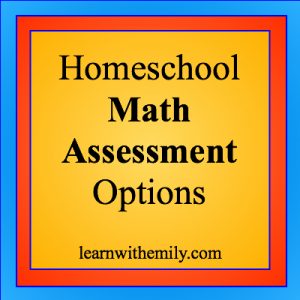This post may contain affiliate links. Affiliate links use cookies to track clicks and qualifying purchases for earnings. Please read my Disclosure Policy, Terms of Service, and Privacy policy for specific details.
When teaching children, it is important to regularly assess their skills to determine if the child understands the concepts being taught and practiced. As many math skills build on previous learning, any deficits will result in difficulty learning more complex concepts and procedures. Although school districts complete standardized testing to determine overall effectiveness of programs, at the classroom or homeschool level, a curriculum-based math assessment will provide more valuable information. Curriculum-based assessments will indicate which skills are mastered and which need further instruction and practice.
Assessments can be completed after specific units, quarterly, twice a year, or even yearly. I recommend assessing math skills at least twice a year. This information will let you know not only what needs to be taught, but will also provide documentation of academic progress.
A variety of testing options are available to homeschool parents including computer-based assessments, paper-based assessments, and a DIY assessment based on state standards.
*Disclaimer: The math assessment options described are provide information about a student’s current skills and what to teach next. These may or may not fit within the bounds of homeschool testing requirements in your state.
Computer-Based Math Assessment
Let’s Go Learn
Let’s Go Learn is an adaptive computer-based assessment, so it will adjust question difficulty based on student responses. The test covers content from Kindergarten to 7th grade. The test will provide information about a child’s current skill levels based on grade level. A diagnostic report is also provided that will give the parent/teacher specific information about skills that are mastered or need further instruction and practice.
Benefits
This test is comprehensive and will provide valuable information on what specific skills to teach next.
Limitations
This assessment is not free. For one student, the test costs $25 (This number was taken off the Let’s Go Learn website on 4/2/18, and may be subject to change).
As this test is adaptive, if a student purposely does not try to get the correct answers, results will not be accurate or beneficial.
Paper-Based Math Assessment
There are a wide range of free paper-based math assessment available. Many homeschool marketed math curriculums include free placement tests. Although these tests will cover content included in each specific curriculum, the quality of information provided may or may not be comprehensive.
Mammoth Math
Mammoth Math provides free grade-level assessments for grades 1-7. Since the tests are paper-based, you can download, print, and give small portions at a time
Benefits
Since the test is paper-based, you can easily provide testing accommodations as needed. For example, you can space the test out over time as needed or only give the child a few problems to complete on one day. The author of mammoth math also explains how to use the assessments to determine not only placement within the program, but also to figure out what specific skills need to be taught. This would be especially beneficial for children who have math skills across multiple grade levels (e.g., 4th in geometry, 1st in time and money, etc.).
The assessment is comprehensive for each grade level included (1-7) and is free.
Limitations
The test will need to be hand graded and analyzed. Although the test is comprehensive, it may not align with the math curriculum you are using.
Make Your Own Math Assessment
If you want to assess a child’s math skills based on their current grade level, you can create your own assessment based on your state’s educational standards for math. Each state has educational standards posted online. Just google search “Arizona State Standards” or “Arizona Educational State Standards” (replacing “Arizona” with your local state). A set of math standards will come up for each grade level. For your assessment, you can go through each of the listed standards at the child’s grade level and have the child complete 1 or more problems for each skill to determine mastery or if further instruction and/or practice is needed.
The same procedure can be used based on other sources as well. As long as the scope of and sequence of skills is comprehensive, you can create an assessment based on results.
Benefits
You created the test and can create just what you need based on the child’s results.
Limitations
Although you will likely get the exact information you need, this method is the most time consuming as you create all of the materials yourself.
Conclusion on Homeschool Math Assessment Options
Regular curriculum-based assessments can provide valuable information about a child’s current skills levels and what to teach next. Assessments can be completed online (e.g., Let’s Go Learn), through a paper-based test (e.g., mammoth math), or created by the teacher/parent based on academic state-standards or another comprehensive source of skills.
CLICK HERE to read about how to select a high quality math curriculum.

